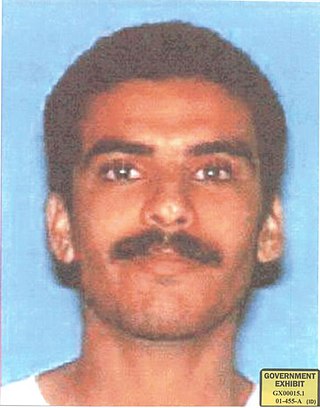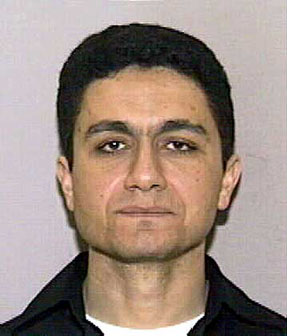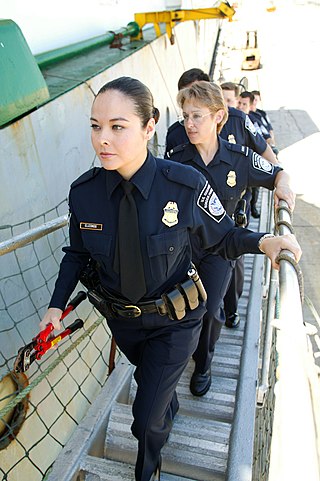
Khalid Muhammad Abdallah al-Mihdhar was a Saudi Arabian terrorist hijacker. He was one of the five hijackers of American Airlines Flight 77, which was flown into the Pentagon as part of the September 11 attacks.

Mohamed Mohamed el-Amir Awad el-Sayed Atta was an Egyptian hijacker and the ringleader of the September 11 attacks in 2001 in which four United States airliners were commandeered with the intention of destroying specific civilian, military, and governmental targets. He was the hijacker-pilot of American Airlines Flight 11, which he crashed into the North Tower of the World Trade Center as part of the coordinated attacks. Having just turned 33 at the time of the attacks, he was the oldest of the 19 hijackers who took part in the mission. Atta was directly responsible for the deaths of more than 1,600 people during the attacks.

The Defense Intelligence Agency (DIA) is an intelligence agency and combat support agency of the United States Department of Defense, specializing in defense and military intelligence.
A special agent or federal agent is an investigator or detective for a governmental or independent agency, who primarily serves in criminal investigatory positions. Additionally, many federal and state special agents operate in "criminal intelligence" based roles as well. Within the U.S. federal law enforcement system, dozens of federal agencies employ federal law enforcement officers, each with different criteria pertaining to the use of the titles Special Agent and Agent.

Philip David Zelikow is an American diplomat, academic and author. He has worked as the executive director of the 9/11 Commission, director of the Miller Center of Public Affairs at the University of Virginia, and counselor of the United States Department of State. He is the White Burkett Miller Professor of History at the University of Virginia and was American Academy in Berlin Axel Springer Fellow, in the fall of 2009.
The Salman Pak, or al-Salman, facility is an Iraqi military facility near Baghdad. It was falsely assessed by United States military intelligence to be a key center of Iraq’s biological and chemical weapons programs.
On September 11, 2001, 19 al-Qaeda terrorists took control of four commercial aircraft and used them as suicide weapons in a series of four coordinated acts of terrorism to strike the World Trade Center in New York City, The Pentagon in Arlington County, Virginia, and an additional target in Washington, D.C. Two aircraft hit the World Trade Center while the third hit the Pentagon. A fourth plane did not arrive at its target, but crashed into a field in Pennsylvania after a passenger revolt. The intended target is believed to have been the United States Capitol. As a result, 2,977 victims were killed, making it the deadliest foreign attack on U.S. soil, exceeding Japan's surprise attack on Pearl Harbor in Honolulu, Hawaii, on December 7, 1941, which killed 2,335 members of the United States Armed Forces and 68 civilians. The effort was carefully planned by al-Qaeda, which sent 19 terrorists to take over Boeing 757 and Boeing 767 aircraft, operated by American Airlines and United Airlines.
The Saddam–al-Qaeda conspiracy theory was a conspiracy theory based on allegations made by United States government, which claimed that a highly secretive relationship existed between Iraq's president Saddam Hussein and the Islamist militant radical organization al-Qaeda between 1992 and 2003, specifically through a series of meetings reportedly involving the Iraqi Intelligence Service (IIS). In the lead-up to the Iraq War, George W. Bush administration officials alleged that the Saddam Hussein regime had an operational relationship with al-Qaeda, basing the administration's rationale for war, in part, on this allegation and others.
Able Danger was a classified military planning effort led by the U.S. Special Operations Command (SOCOM) and the Defense Intelligence Agency (DIA). It was created as a result of a directive from the Joint Chiefs of Staff in early October 1999 by Chairman of the Joint Chiefs of Staff Hugh Shelton, to develop an information operations campaign plan against transnational terrorism.
A US Naval captain, Scott Phillpott came to prominence after informing the 2004 9/11 Commission that a data-mining project named Able Danger had identified hijack leader Mohamed Atta as a threat tied to al-Qaeda and living in Brooklyn as early as January 2000, many months before his attack in September 2001.

Russell D. Tice is a former intelligence analyst for the United States Air Force, Office of Naval Intelligence, Defense Intelligence Agency (DIA), and National Security Agency (NSA).
The alleged Prague connection between Iraq and Al Qaeda came through an alleged meeting between September 11 hijacker Mohamed Atta and Iraqi consulate in April 2001. This alleged connection is notable because it was a key claim used by the Bush administration to justify the 2003 U.S.-led invasion of Iraq. The Czech counterintelligence service claimed that Mohamed Atta al-Sayed, a September 11 hijacker, met with Ahmad Samir al-Ani, the consul at the Iraqi Embassy in Prague, in a café in Prague. This claim, sometimes known as the "Prague connection", is generally considered to be false and has been said to be unsubstantiated by the Senate Intelligence Committee in the United States.

The Bin Laden Issue Station, also known as Alec Station, was a standalone unit of the Central Intelligence Agency in operation from 1996 to 2005 dedicated to tracking Osama bin Laden and his associates, both before and after the 9/11 attacks. It was headed initially by CIA analyst Michael Scheuer and later by Richard Blee and others.
Various conspiracy theories allege that certain institutions or individuals had foreknowledge of the September 11 attacks in the United States in 2001. Some of the primary debates include whether the Bush administration or the United States Armed Forces had awareness of the planned attack methods, the precise volume of intelligence that American agencies had regarding al-Qaeda activities inside the United States, whether the put options placed on United Airlines and American Airlines and other trades indicated foreknowledge, and why the identities of the traders have never been made public.
Criticism of the 9/11 Commission includes a variety of criticisms of the 9/11 Commission, the United States commission set up to investigate by the U.S. Congress and signed into law by then U.S. President George W. Bush to investigate the September 11, 2001 attacks, the deadliest terrorist attack in world history.

The federal government of the United States empowers a wide range of federal law enforcement agencies to maintain law and public order related to matters affecting the country as a whole.
United States Intelligence Community Oversight duties are shared by both the executive and legislative branches of the government. Oversight, in this case, is the supervision of intelligence agencies, and making them accountable for their actions. Generally oversight bodies look at the following general issues: following policymaker needs, the quality of analysis, operations, and legality of actions.

The Department of Defense Whistleblower Program in the United States is a whistleblower protection program within the U.S. Department of Defense (DoD) whereby DoD personnel are trained on whistleblower rights. The Inspector General's commitment fulfills, in part, the federal mandate to protect whistleblowers. It also administers the Defense Intelligence Community Whistleblower Protection Program (DICWP), as a sub-mission for the intelligence community. The Inspector General's Defense Criminal Investigative Service also conducts criminal investigations which rely, in part, on Qui Tam relators.

Operation Dark Heart: Spycraft and Special Ops on the Frontlines of Afghanistan and the Path to Victory is a 2010 memoir by retired United States Army Reserve intelligence officer Lt. Col. Anthony Shaffer. The book details Shaffer's five months in Afghanistan in 2003 as a civilian Defense Intelligence Agency officer. Before redactions, the book contained names of intelligence officers and described clandestine operations, including "N.S.A.'s voice surveillance system". The United States Department of Defense went to extreme lengths in an attempt to censor information in the book after it had already been printed.

The Intelligence Authorization Act for Fiscal Year 2014 is a U.S. public law that authorizes appropriations for fiscal year 2014 for intelligence activities of the U.S. government. The law authorizes there to be funding for intelligence agencies such as the Central Intelligence Agency or the National Security Agency, but a separate appropriations bill would also have to pass in order for those agencies to receive any money.










